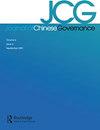Chinese state-owned commercial banks in reform: inefficient and yet credible and functional?
IF 3.7
3区 社会学
Q1 POLITICAL SCIENCE
引用次数: 5
Abstract
Abstract After the initial public offerings of state-owned commercial banks (SOCBs) in 2005–2010, the transformation of the property structure blurred the conventional boundaries between public and private property in China while the state continued to play an important role in the regulation and operation of this ‘hybrid property’: the mixed public-private ownership structure adopted for previously wholly SOCBs. It is could be that the perceived lending bias against private enterprises was a rational decision made by SOCBs in China, partly due to the high transaction costs of risk evaluation and the lack of any formal channels to mitigate the credit risks of such loans. The hybrid nature of SOCBs property rights makes them a credible and convenient channel for the state to provide counter-cyclical lending to contain any exogenous (economic) shocks that might occur as well as long-term financial support for development purposes in the transitional economy and thus contribute to socio-economic and political stability in China. Instead of a stumbling block for economic reforms in China, as posited by the conventional institutional analysts, the ambiguous property rights of SOCBs and their practice of offering favourable loan conditions to state-owned enterprises could actually contribute to their profitability and thus the continuity of hybrid property banking systems and their credibility in China.改革中的中国国有商业银行:效率低下,但仍然可信和有效?
摘要2005–2010年国有商业银行首次公开募股后,财产结构的转变模糊了中国公共财产和私人财产之间的传统界限,而国家继续在这种“混合财产”的监管和运营中发挥重要作用:以前完全由国有独资企业采用的公私混合所有制结构。对私营企业的贷款偏见可能是中国国有商业银行做出的理性决定,部分原因是风险评估的交易成本很高,而且缺乏任何正式渠道来降低此类贷款的信用风险。国有商业银行产权的混合性质使其成为国家提供反周期贷款以遏制可能发生的任何外部(经济)冲击的可靠和方便的渠道,并为转型经济中的发展提供长期金融支持,从而有助于中国的社会经济和政治稳定。传统机构分析师认为,国有商业银行模糊的产权及其向国有企业提供优惠贷款条件的做法,并不是中国经济改革的绊脚石,反而有助于它们的盈利能力,从而有助于混合型房地产银行体系的连续性及其在中国的信誉。
本文章由计算机程序翻译,如有差异,请以英文原文为准。
求助全文
约1分钟内获得全文
求助全文

 求助内容:
求助内容: 应助结果提醒方式:
应助结果提醒方式:


